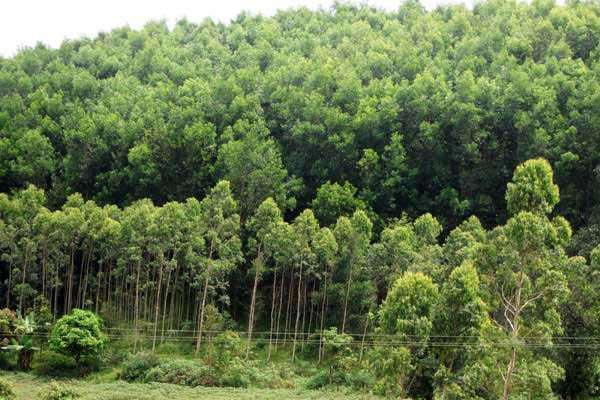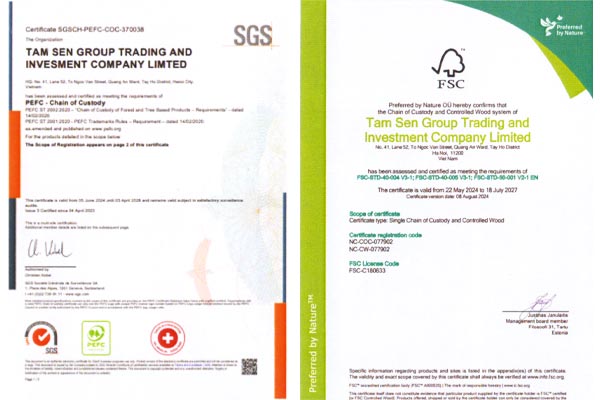Wood Pellets from Vietnam: A Sustainable Energy Solution

Wood pellets from Vietnam have become a prominent player in the global renewable energy landscape. Offering an eco-friendly alternative to traditional fossil fuels, these pellets are derived mainly from acacia wood, a rapidly renewable resource.
As global demand for cleaner, greener energy increases, wood pellets produced in Vietnam stand out for their sustainability, efficient production processes, and reduced carbon emissions.
As a leader in Vietnam's wood pellet industry, we contribute to sustainable development while meeting international energy needs.
The Rise of Wood Pellets as a Green Energy Source
What Are Wood Pellets?
Wood pellets are a type of biomass fuel made from compressed wood fibers. Vietnam’s wood pellets, mainly produced from acacia wood, serve as a renewable energy source capable of replacing coal and other fossil fuels in various energy applications. With the global push toward carbon neutrality, wood pellets are recognized for their ability to generate heat and power with significantly lower greenhouse gas emissions.
Why is Vietnam Leading in Wood Pellet Production?
The country’s vast forestry resources, favorable growing conditions for acacia trees, and commitment to sustainable forestry practices have positioned Vietnam as a sustainable leader in the biomass energy sector.
Vietnam has rapidly emerged as a key supplier of wood pellets to global markets, particularly for South Korea and Japan, where renewable energy policies prioritize the use of biomass fuels.
Korea and Japan are the two largest importers of Vietnamese wood pellets, accounting for more than 95% of Vietnam’s total exports. As per data from the General Department of Customs, Vietnam shipped an impressive 4.9 million metric tonnes worth $0.79 billion in 2022. During the first five months of 2023 (5M/2023), exports rose to 1.57 million tonnes, with export value reaching approximately $256.5 million.
Production and export of wood pellets from Vietnam are increasing since few years. You can find a detailed report about this trend here: Wood pellet production and export from Vietnam.
Acacia Wood: A Renewable and Sustainable Resource
Acacia Wood’s Fast Growth Cycle
Acacia trees, the main source of wood for Vietnamese pellets, are known for their rapid growth, reaching maturity in just five years. This short growth cycle ensures a steady and renewable supply of raw material for pellet production, allowing forests to regenerate quickly.
This fast-growing feature of acacia distinguishes it from slower-growing hardwoods, ensuring that wood pellet production does not lead to deforestation or the depletion of natural forest reserves.
Sustainable Forestry Practices in Vietnam
As one of the largest wood pellet suppliers in northern Vietnam, we source our acacia wood from responsibly managed plantations. Our factory utilizes three main sources: its own +1,000-hectare plantation, local farmers with +5,000 hectares certified under FSC Controlled Wood (FSC CW), and forestry companies managing +15,000 hectares certified under F.S.C. Forest Management (FSC FM) standards.
These certifications guarantee that the wood is harvested sustainably, ensuring environmental conservation while supporting the local economy.
Read more about our FSC-certified wood sources here.
Preserving Biodiversity Through Acacia Plantations
By focusing on acacia wood, we help protect slower-growing hardwood species, preserving biodiversity and maintaining forest ecosystems.
Acacia plantations serve as an effective carbon sink, absorbing more carbon dioxide during their growth compared to older forests. This contributes to reducing atmospheric carbon levels and mitigating the impact of climate change.
We are a Leader in Sustainable Pellet Production

Efficient and Environmentally Friendly Production Process
Our production capacity reaches 25,000 tons of wood pellets per month, and all our production adheres to the stringent export standards of Japan and Korea. The proximity of the factory to its wood sources minimizes transportation distances, reducing the carbon footprint associated with raw material transport. By using local and certified sustainable sources, we can guarantee that our production process remains eco-friendly from start to finish.
Energy-Efficient Manufacturing Techniques
Our production process of wood pellets is designed with sustainability in mind. The factory employs energy-efficient techniques that minimize waste and maximize the utilization of every part of the acacia wood.
This results in a highly efficient process where nearly all wood is converted into usable pellets, reducing waste and promoting sustainable energy use.
Transportation and Carbon Footprint Reduction
Bulk Carriers: An Eco-Conscious Shipping Method
Transporting wood pellets internationally is another aspect where environmental considerations come into play. Wood pellets from Vietnam are shipped using bulk carriers, which are highly fuel-efficient compared to other shipping methods.
These large vessels transport vast quantities of pellets in a single voyage, significantly reducing per-unit carbon emissions. By leveraging this method of transportation, Vietnamese wood pellets maintain a low carbon footprint, even as they travel to markets worldwide.
Global Markets: Meeting the Standards of Japan and Europe
Our wood pellets meet the rigorous sustainability and quality standards required by major markets like Japan and Korea.
These markets request high-quality biomass fuels that not only provide efficient energy but also comply with environmental regulations that prioritize carbon reduction and sustainable sourcing. Our commitment to these standards solidifies our position as a trusted supplier of green energy solutions.
Environmental Impact: Carbon Neutrality and Reduced Emissions
Wood Pellets as a Carbon-Neutral Fuel
One of the most significant environmental benefits of wood pellets is their carbon neutrality. When wood pellets are burned, the carbon dioxide released is roughly equal to the amount absorbed by the trees during their growth.
This closed carbon cycle means that wood pellets do not contribute to the net increase of carbon dioxide in the atmosphere, unlike fossil fuels, which release carbon stored for millions of years.
Our Role in Sustainable Development
Supporting Local Communities and Sustainable Forestry
We don't only prioritize environmental sustainability but also support local farmers and communities through its partnership model. By sourcing wood from local farmers and certified forestry companies, the factory contributes to local economies while promoting sustainable land management practices.
These collaborations ensure that the benefits of sustainable energy extend beyond environmental gains to include social and economic development.
Acacia cultivation helps farmers to escape poverty by giving them stable work and a regular income.
Commitment to High Quality and Environmental Responsibility
Our production of high-quality wood pellets is driven by a commitment to both competitive pricing and environmental stewardship.
The factory continuously invests in improving its processes to ensure that its pellets meet the highest international standards while minimizing the environmental impact. This dual focus on quality and sustainability makes us a leader in the global wood pellet market.
Conclusion: Wood Pellets as a Green Solution
In conclusion, wood pellets from Vietnam, particularly those we produce and export, represent a vital step toward sustainable energy solutions. Made from renewable acacia wood, produced in an eco-friendly manner, and transported efficiently, these pellets offer a low-carbon alternative to traditional fossil fuels.
As the world shifts toward renewable energy, Vietnam’s wood pellet industry will continue to play a crucial role in meeting global energy needs while protecting the environment and promoting sustainable development.
By choosing wood pellets from Vietnam, global markets can embrace a cleaner, greener, and more sustainable future. The rapid regeneration of acacia wood, efficient production processes, and low-emission transportation methods make Vietnamese wood pellets a cornerstone of the renewable energy sector.